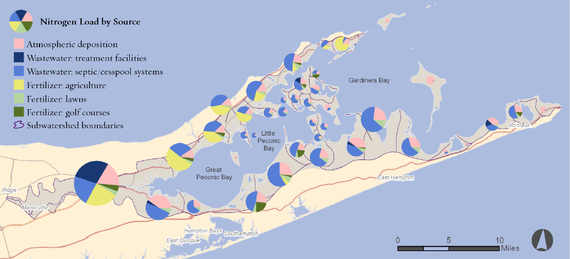This is a story that I've written now several times. It's not so much dog bites man as man bites himself (again). A long list of Long Island beaches will be closed this weekend because heavy rains has submerged countless cesspools; now that contaminated water is following into our rivers, ponds, and bays, along with fertilizer from lawns and from farms.
The e. coli count will be the first issue. That's directly from the septic tanks / failing cesspools (a 19th Century technology that's pretty close to worthless in high waters). The second will be the massive algal blooms that will come soon after -- blue green algae in our ponds, rust tide in Peconic Bay, brown tide, red tide. All the nutrients, all the nitrogen from fertilizer combined with nitrogen from human waste, fuel the blooms immensely.
This what happens on Long Island in the warm months every time it rains. And it gets worse by the year. Before 1984, we did not have algal blooms around Long Island. Headlong development has caught up with us. What led us to think that we could put 500,000 septic tanks / cesspools in the low lying sand of Long Island and not suffer some consequences? That said, we had no definitive scientific link between nitrogen from our septic tanks and the explosion of algal blooms now threatening almost all our waters until 2005.
We need a Long Island where when there's a good healthy rain, we are not worried about how many tons of nitrogen and gallons of polluted ground water is being washed into our waters with that. Its getting so some beaches are closing and staying closed. See "Can Long Island Be Saved, Part IV - Crescent Beach, Beach Closures and Cesspools."
So then what can we do so that we can enjoy a summer rain again? While the septic tanks are the big problem, we can all help by getting away from using non organic fertilizers. "What," you say, "what about my lawn?" There are over 100 certified organic yard care companies on Long Island, as per New York State's Department of Environmental Conservation web site. Here's a handy map to find such companies. Another thing to consider here -- we live on top of our drinking water. Anything you put on our lawn eventually seeps down into the aquifer. 120 different pesticides have been detected in our drinking water. Nitrogen levels in the aquifer from septics, but also fertilizer, is rising rapidly. You owe it to your neighbor, your children and their children then to change your lawn care practices.
Now as for farming practices, organic and sustainable farms, vineyards, and restaurants are springing up all over the East End of Long Island. Here is a map of them. We should make it a practice of rewarding these actors for taking the risk. In other words, buy local, buy organic and sustainable. Otherwise, those planting crops that are fertilizer or pesticide intensive need to think about how their practices are affecting their neighbors, and those who up until recently worked the bays harvesting shellfish. Peconic Bay's scallop population, and with that the whole scalloping industry was recently wiped out by rust tide, an alga driven by high nitrogen loads, where agricultural practices have to share the blame.
Please note this map of Peconic Bay, courtesy of The Nature Conservancy.
Certainly low lying septic tanks are a big part of the problem, but along the shores of Peconic Bay, the pie charts show there's a significant contribution from agriculture. This must be addressed for it has to do with the future of the whole East End.
Lastly, there is the septic tank / cesspool issue. The county is scrambling to identify viable on site denitrification systems and have some certified by early 2015. It's an emerging technology. We desperately need this tech here on Long Island, and everyone at the county and state level is working to help turn Long Island into a global center for waste water treatment solutions -- When life hands you a lemon....
This whole situation will take, say, $10 billion to fix -- Replacing 500,000 septics with either sewers or on site treatment tech. That's a very scary number at first. But there are 2.8 million people on Long Island. That comes out to $3,571 per person. Amortize it over 30 years like a proper infrastructure project, and it comes out to $25 a month per person, assuming the whole project is funded with a 7.5% bond.
Worth it? To get our shellfish back, to have our kids swim, fish, and go to the beach as we had? Do we want to continue to be a mecca for millions during the summer? Do we want Long Island to remain a place to live and raise a family? Sewering will help revitalize downtowns -- Patchogue is reborn, with a vibrant Main Street and apartments for the young and the retired. That can happen in a lot of places, strengthening Main Street and community.
Going green with this infrastucture investment will help boost the economy. It was Long Island's beauty that brought us there in the first place. The more the East End becomes like Napa, the better for everyone, you could say. Having abundant fish, large shellfish harvests, with Long Island's many birds, it's amphibians and reptiles even beaver and otter,
There's hundreds of billions of dollars of real estate at stake on Long Island, and the science is saying we need to move quickly. New York State now lists all our waters as impaired. Soon they will be beyond the point of no return.
So yes, this is a public appeal -- we must change what we are doing, stop putting nitrogen into the ground and so then into our water, or Long Island will not be saved.
It is within our power to change our fate. I want to enjoy the rain again.

